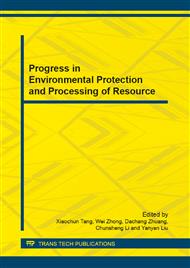p.2187
p.2191
p.2195
p.2201
p.2205
p.2211
p.2215
p.2223
p.2227
Path Analyses of Sustainable Utilization of Resources Based on “Inter-Generation Equity” Idea
Abstract:
From the traditional economics’ perspective, the major cause of resources exhaustion is positive discount rate policy. Based on the “economic man” hypothesis, this policy departs from sustainable development for its ignorance of inter-generation equity. In order to realize sustainable exploitation of resources, we should stick to inter-generation equity and sustainable development as our principle. Howarth model and Synthetic efficiency sustainability model provide the thoughts of “efficiency on the premise of sustainability” and “sustainability on the premise of efficiency” respectively.
Info:
Periodical:
Pages:
2205-2210
Citation:
Online since:
February 2013
Authors:
Price:
Сopyright:
© 2013 Trans Tech Publications Ltd. All Rights Reserved
Share:
Citation:


